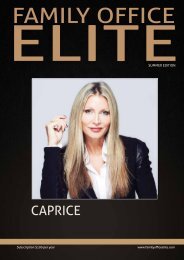Family Office Elite Spring_16
Family Office Elite Magazine, the wealthiest audience in the world. Family Office Elite Magazine is a very high class bespoke publication and a porthole to the ultra-wealthy family offices and UHNWI sectors. The magazine includes editorials from recent events and experts from the ultra-wealthy Family Office community.
Family Office Elite Magazine, the wealthiest audience in the world.
Family Office Elite Magazine is a very high class bespoke publication and a porthole to the ultra-wealthy family offices and UHNWI sectors. The magazine includes editorials from recent events and experts from the ultra-wealthy Family Office community.
Create successful ePaper yourself
Turn your PDF publications into a flip-book with our unique Google optimized e-Paper software.
developed markets, or even other frontier markets<br />
is very low. Each frontier market tends to have their<br />
own opportunities, and challenges, and with their<br />
own currency, political landscape, and natural<br />
resources they show quite different behaviours in<br />
stock market performance.<br />
• Demographics tend to be favourable with<br />
relatively young and fast-growing populations.<br />
• Low labour costs mean that they attract industries<br />
from developed markets, and even emerging<br />
economies. Consider the current shift from Chinabased<br />
manufacturing of low cost goods to Vietnam<br />
and Bangladesh.<br />
• Immature financial markets in frontier countries<br />
mean that with fewer local and international<br />
investors valuations are relatively lower than those<br />
in emerging and developed markets. Further, these<br />
markets are not very actively researched which<br />
present opportunities to generate sustainable<br />
longer term returns.<br />
But with all the good news, frontier markets are<br />
exposed to a number of risks too. For example,<br />
the possibility of war and terrorism, policy shifts,<br />
political instability, corruption and immature<br />
financial markets can depress share prices. In<br />
addition access to these markets can be difficult<br />
with troublesome account opening procedures,<br />
capital controls, low liquidity and limitations on<br />
foreign ownership of listed companies. All of these<br />
challenges are also seen in emerging markets, but<br />
perhaps to a lesser extent.<br />
Given the idiosyncratic risk involved with each<br />
frontier market, the best way to invest in frontier<br />
markets is to select a number of them in order to<br />
diversify the idiosyncratic risk away and benefit<br />
from the overall expected higher GDP growth<br />
translating into share price performance.<br />
Through the low correlation between the various<br />
frontier markets, investing in a number of them<br />
will reduce the overall volatility to a level that is<br />
significantly lower than that of the MSCI World<br />
Index. For example, the volatility of our AFC Asia<br />
Frontier Fund is only 9.71% while the correlation<br />
between the Fund and the MSCI World index since<br />
inception nearly four years ago, is only 0.34. At the<br />
same time, its correlation with the MSCI Emerging<br />
Markets index stands at an even lower 0.33.<br />
Annualised Volatility Cumulative Returns*<br />
AFC Asia Frontier Fund 9.71% 68.22%<br />
MSCI World Index 11.80% 19.07%<br />
MSCI Emerging Market Index 15.30% -28.72%<br />
MSCI BRIC Index 19.02% -34.60%<br />
MSCI Frontier Markets Index 12.30% -2.96%<br />
MSCI Frontier Markets Asia Index 15.24% -3.17%<br />
How to obtain frontier market exposure<br />
One way investors might like to get exposure to<br />
frontier markets is through an ETF. While this may<br />
be a good approach in developed economies, in<br />
frontier markets this tends to be a disappointing<br />
choice. In many cases frontier markets ETFs have a<br />
large to very large tracking error. This is the result<br />
of the difficulty of investing in these immature<br />
markets, caused by low liquidity which increases<br />
bid-offer spreads and trading costs, limits on<br />
foreign ownership, and trading suspension<br />
arrangements during volatile periods.<br />
Actively managed diversified frontier funds<br />
may be a better choice. A fund manager that can<br />
invest in a range of frontier countries can assess<br />
the idiosyncratic risk of each of the markets at all<br />
times, and shift the funds to the most promising<br />
markets. He/she could also manage currency risk<br />
in the same fashion.<br />
An active manager also has the capability to<br />
select the best companies in his/her universe for<br />
investment, and since the frontier markets are less<br />
mature, competition for the best stocks is less,<br />
offering more chances for undiscovered gems<br />
and undervalued quality companies, resulting<br />
in better chances for active managers to be able<br />
to generate alpha compared with the developed<br />
markets.<br />
81<br />
FAMILY OFFICE ELITE MAGAZINE



